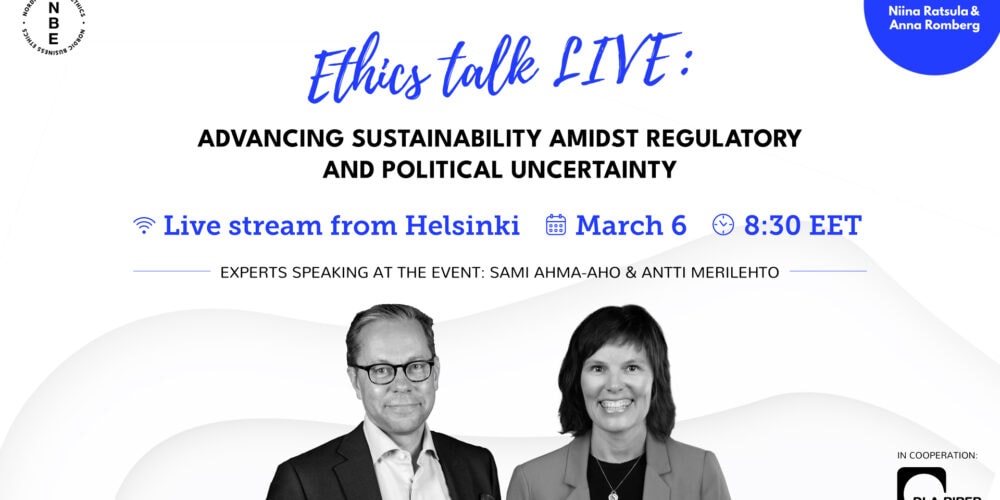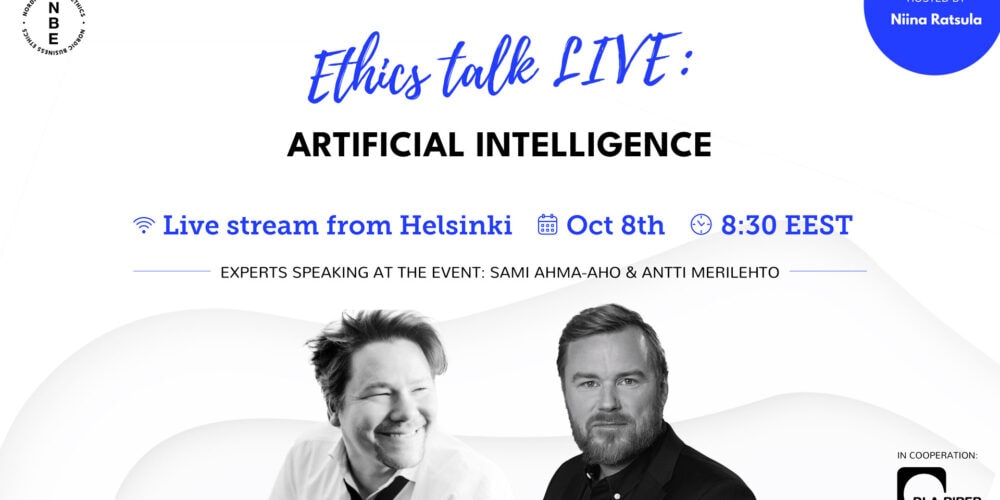Ethics Talk live: The link between human rights and corruption
This blog post summarises the EthicsTalk LIVE on December 9th, 2021. Our amazing guests were Hayaat Ibrahim, Secretary General of The Swedish Anti-Corruption Institute, Heidi Platou, Head Advisor at Statkraft and Sarah Ellington, Legal Director at DLA Piper. If you want to read more about them, head over to the event page.
If you don’t want to miss a single word, the recording of the event can be watched on YouTube.
The link and the fundamental clash
The link between the two is clear, as Sarah states: “corruption affects the enjoyment of human rights”. Corruption is based on secrecy, deprivation and benefits only a few, whereas human rights are based on enabling, transparency and benefits larger groups. It is important to notice the link between them, but to understand their fundamental differences. Anna summarised Sarah’s speech by saying that “corruption is about stopping to do something that is wrong whereas human rights is about starting to do something that is right”. If corruption ended tomorrow, it would not mean that human rights would be equal to all. Furthermore, human rights violations may be the result of legal actions.
Through her experiences Hayaat has seen the connection between bribery, corruption, and the enjoyment of human rights especially regarding access to water, health, and education. Hayaat has a simple advice: “we need to be sincere and concrete so that we can guarantee basic rights to people whose lives we affect”. Bribery is costly and particularly affects societies that have fewer resources. Marginalized groups are often easy targets and least capable of paying bribes. Yet, they pay the most bribes in comparison to their wages. To many of us corruption may be invisible, but it certainly is not a victimless crime.
Shifting the focus
Heidi continued with the similarities by saying that companies in general deal with corruption and human rights matters when problems occur. The focus on human rights is moving from not doing harm and avoiding liability to creating a positive impact. Heidi states that “the focus of human rights is not the company, but the people around us, the rightsholders”. Even though guidelines and principles have been around since 2011, in commercial context human rights are “the new kid on the block” as Heidi points out.
Companies who would like to do more have asked from Sarah if they can they take similar regulatory approach to human rights than what is in use with anti-corruption. The upcoming legislation is yet unpublished but if it mirrors the UN guiding principles it is expected to include due diligence, mitigation actions, transparency, and remedy. The first two are familiar from anti-corruption legislation, whereas the second two are not. In fact, being transparent about anti-corruption measures may be counterproductive. On the human rights side, transparency and open communication between societies and companies is a key measure. Regarding remedies, there is not yet a way to direct remedies to the ones that were affected. Sanctions, for example, at the moment are paid to the DOJ or the EU Commission rather than the societies and taxpayers.
Legislation is at a very early level and much focused on transparency rather than achieving a certain level. Danger in increasing legislation in the future is that the focus will move again towards the organisations’ risks rather than the rightsholders. Legislation can however level the playing field, so that a minimum level would be achieved. This will help drive the matter forward and increase awareness in the business community.
Human rights discourse in the corporate world is not yet as visible as for example with corruption as it is not so sanctions driven. Media is already taken an interest on reporting about big sanctions and corporate fines, however since there rarely is a monetary value in human rights related news, there is not much to say.
Human rights program – yet another paper program?
As mentioned before, the focus of compliance and human rights programs are different. It is important that companies understand the differences, as they will not improve matters through the wrong method. Tone from the top, however is relevant to both. As the impact is outside of the organisation, it really requires a willingness to do good and may be hard to justify, especially if more costly than the alternative.
A good starting point for a human rights program is the UN guiding principles and the OECD guidelines. Operationalising human rights means giving concrete examples with practical steps. Through this organisations can see how their actions, or their supply chains, have impact on individuals’ human rights. Through impact assessment organisations can start assessing the actual and potential impact of their operations on the ground.
Awareness raising is the second thing that will help us drive this matter forward. Even though the guidelines may seem overwhelming it is important to start. Sarah reminds, that “you do not need to do this all at once. No one is expecting you to be perfect and be able to mitigate every single risk from day one”. Even the UN guiding principles talk about prioritizing salient risks.
Also, collaboration is essential, as organisations are part of ecosystems created from their value chains. Thus, dialogue must be held with not only the end party, but with the other commercial parties in the value chain. The impact will be much greater if everyone is aligned and doing something that works in practice. If each party is trying to do something different, it results in gaps where issues can arise.
As a consumer, you can affect human rights by supporting organisations that do care about human rights. If you want to read more about conscious capitalism, click here to read Philip Winterburn’s blog post.



